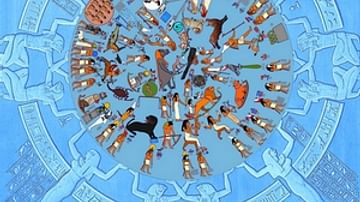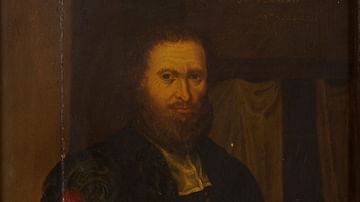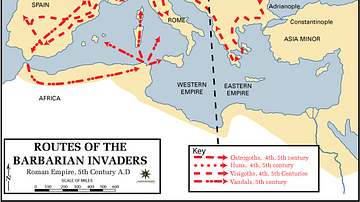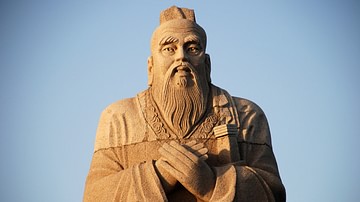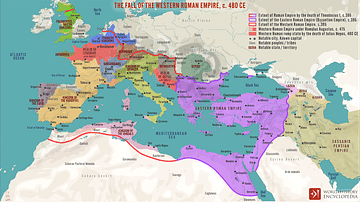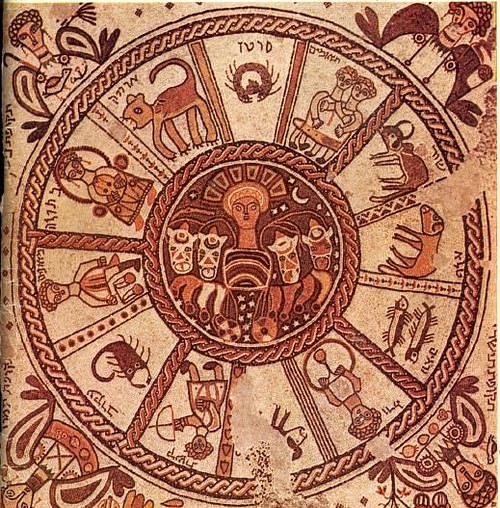
Western astrology refers to a form of divination based on the motion of astronomical objects such as stars or planets. The belief that astronomical objects are divine or influence events on Earth is found in many cultures, but the practices grouped under the umbrella of 'Western astrology' have their origins in the Near East and ancient Mediterranean.
In antiquity and the Middle Ages, there was virtually no distinction between astronomy, which is the study of objects in outer space, and astrology, which is the superstition that these objects can influence events on Earth. The belief that celestial bodies could exert control over events on Earth was one of the driving motivations behind their study in the past. During the Renaissance, astrology was treated as both a scientific and spiritual pursuit, albeit one that attracted scholarly criticism.
By inspiring astronomical inquiry, astrology ultimately helped birth the scientific innovations that disproved its validity. Advances in natural science and our understanding of the solar system during the 18th century led to the debunking of astrology and its accompanying beliefs. This shift in scientific thought created a clear distinction between the science of astronomy and the pseudoscience of astrology. However, popular belief in astrology persists into the modern period.
Ancient Babylon & Greece
Hellenistic astrology traces its roots to Babylon, where astronomers were interpreting astronomical phenomena as omens by the 1st millennium BCE. The Babylonians would later begin practicing natal astrology to try to predict events in a person's life based on the position of the stars and planets at the time of their birth. Ancient Greek authors claimed that astrology was introduced to Greece by a Babylonian priest named Berossus, who moved to the Greek island of Kos and established a school of astronomy and astrology around 280 BCE. This story may contain a kernel of truth, as the conquest of Persia by Alexander the Great (r. 336-323 BCE) in the 4th century BCE led to the transfer of ideas between Greece and the Near East. However, Hellenistic astrology was most heavily influenced by Greek philosophy, ultimately containing only faint traces of Babylonian cosmology.
The zodiac and astrological system used in Western astrology began to take on a recognizable form during the Hellenistic period (332-30 BCE). Natural philosophers reasoned that the stars and planets could influence Earth in the same way that the Sun affected life and the Moon moved the tides. People in the Hellenistic Mediterranean commonly consulted astrologers hoping that they could predict the future, reveal hidden information, and recover lost or stolen items.
Astrology was also incorporated into ancient Greek medicine and Greek philosophy, as it was theorized that the planets had both physical and metaphysical impacts. The belief that certain planets held power over specific body parts, and that it was possible to predict the best timing for medical treatment based on planetary positions, influenced Western medical thought until the early modern period.
Roman Empire
Astrology was widely practiced in the Roman Empire, alongside other types of divination like augury. Roman astrology was heavily influenced by Greek astrology, and most surviving information about Hellenistic astrology has been transmitted through Roman authors like Vettius Valens (125 to c. 175 CE) and Plutarch (c. 45-50 to c. 120-125 CE). The validity of astrology was the subject of heated debate, particularly the question of whether it was possible to predict human actions.
Roman emperors such as Augustus (r. 27 BCE to 14 CE) minted coins bearing zodiac signs, and published horoscopes that predicted their success and prosperity. Roman politicians realized the potential for astrology to be used to incite rebellion or political uncertainty, and sought to regulate it. It was illegal for Roman astrologers to make predictions about the future of the Roman Empire or the emperor himself. Despite this prohibition, many astrologers served prominent political figures, and others made predictions about political events. The Roman emperor Vitellius (r. 69 CE) eventually outlawed astrology entirely after astrologers who disliked him made predictions about his downfall.
Roman interest in astrology declined during Late Antiquity, due in part to the adoption of Christianity. Theologians such as Augustine of Hippo (354-430 CE) opposed astrology on the grounds that the Christian principles of free will directly contradicted the concept of astrologically determined fate. Astrology would not be widely practiced in Europe until it was reintroduced in the Late Middle Ages.
Middle Ages
During the Islamic Golden Age, Greco-Roman astronomical texts were preserved and translated by Arab and Persian authors. They also studied works of Indian astrology, which had itself been influenced by Mesopotamian and Greek beliefs in antiquity. Islamic scholars in the Middle East and Iberia produced many new works of astronomy and astrology, such as the Introductorium of Abu Ma'shar al-Balkhi (787-886 CE) and Al-Kindi's (801-873 CE) De Radiis. Among the technological innovations of the period were the equatorium, an instrument for calculating the positions of stars and planets, and the creation of astronomical tables to catalogue this data.
Many of these Arabic-language texts were translated into Latin during the 12th century and made their way into the libraries of medieval Europe. Sicily and the Iberian peninsula were early crucibles of astrological writing, because of their closer links to the Islamic world. This formed the basis of Medieval European astronomy and astrology.
By the Middle Ages, it was no longer believed that the planets or stars were gods, but many still believed that they influenced or foretold events on Earth. Zodiac signs and planets were believed to hold power over specific humours, body parts, and disease processes. Medieval physicians used astrology to determine what course of treatment to administer, and predict a patient's outlook. Historian Hilary Carey summarized medieval beliefs about cosmic influences:
Just as the sun maintained control over vegetable life, and the moon over the tides and the female menstrual cycle, so earthly events harmonised with heavenly events, like a string tuned to the same pitch. The same principle governed the operation of other occult sciences such as magic, alchemy and geomancy. (8)
Like many occult arts practiced in Medieval Europe and the Middle East, astrology occupied an uneasy space in the religious framework of the era. Claiming to be able to predict the future through magical or secular means, as opposed to divine inspiration, could be interpreted as heresy. The premise of predestination also ran contrary to the doctrines of Judaism, Christianity, and Islam, which emphasized the importance of free will.
Despite the volume of Arabic texts pertaining to astrology, it was actively discouraged by imams. Ecclesiastical authorities in Europe also frowned upon astrology as a potentially dangerous enterprise, since it involved communication with spiritual entities. Astrology is mentioned several times in the Talmud and was viewed by some medieval rabbis as an acceptable avenue of scientific study. Jewish astronomers such as the Persian mathematician Mashallah ibn Athari (740-815 CE) made notable contributions to medieval astrology.
Astrologers in Europe risked being accused of communing with demons or charged with heresy. Many Christian authors in medieval Europe made a distinction between permissible astrology and astrology that was demonic in nature. While trying to learn secret knowledge through astrology was forbidden, an exception was usually made for astrology performed for practical purposes related to medicine, agriculture, or navigation.
Proponents of astrology attempted to legitimize it as a science by emphasizing its basis in naturalist philosophy, distancing it from demonic or magical practices. Although the medieval Church never overtly endorsed astrology, it was often tolerated. Thomas Aquinas (1225-1274) wrote that the celestial bodies might hold some sway over physical phenomena, but not over human free will or reason. Thomas felt that astrology was permissible in certain situations, such as predicting weather or astronomical phenomena.
As medieval scholars became more interested in the sciences, astrology gained popularity with the ruling elite. Many European monarchs employed astrologers at their court, among other scholars and entertainers. The Italian astronomer Guido Bonatti (1210 to c. 1296) was one of the most significant figures in medieval astrology, serving as astrologer for the city of Florence and advisor to Frederick II, Holy Roman Emperor (l. 1194-1250 CE). Bonatti rose in esteem after making successful predictions about military outcomes. Nevertheless, Dante Alighieri (1265-1321) depicted Bonatti and other astrologers as residing in Hell in his Divine Comedy.
For some medieval rulers, astrology was little more than an amusement, while others consulted astrologers before planning important events such as coronations, weddings, or military ventures. King Alfonse X of Castile (r. 1252-1254) was nicknamed "the Astrologer'' because of his interest in the stars. He commissioned the Alfonsine Tables, a set of astronomical tables which updated earlier Arabic tables with data from the day of his coronation onwards.
Middle Eastern astrologers theorized that an alignment or conjunction of the planets caused historical events such as wars and natural disasters. The theory of conjunction became popular in Europe during the late Middle Ages to explain conflicts and social upheavals. Some astrologers made bold predictions about the end of days, and the French cardinal Pierre d'Ailly (1351-1420) consulted astrology to determine whether the Western Schism between rival popes in Rome, Avignon, and Pisa heralded the coming of the Antichrist. Medieval astrologers also attempted to understand historical trends through astrology, explaining past events like the rise of Islam or the fall of the Western Roman Empire through the movements of planets.
Some astrologers attempted to forecast the appearance of diseases or plagues in certain cities. In 1348, physicians at the University of Paris advised Philip VI of France (r. 1328-1350) that a conjunction of Jupiter, Saturn, and Mars in 1345 was responsible for the Black Death (1347-1352). This astrological theory for the pandemic's origin gained prominence in the following years, as the actual microbial cause of the disease was unknown at the time.
Renaissance
During the Renaissance, interest in classical literature and natural philosophy became more pronounced. Numerous volumes of Greek literature were translated into the more widely understood Latin. At the time, it was generally felt that the history of a practice conferred some level of credibility, which meant ancient 'sciences' inherited a level of validity by virtue of their age. Astrology had long been established as a component of medical, mathematical, and philosophical studies, but it could now reach larger audiences. The adoption of the printing press in 15th-century Europe allowed astrologers to sell natal charts and almanacs to anyone interested in their future.
In Renaissance Europe, astrology became a method of political propaganda much as it had been in the Roman Empire. Some astrologers published prognostications about the health, fortunes, and deaths of ruling figures. Others continued in the long tradition of acting as courtly advisors, using artful interpretations of astrology to climb the social ladder. Figures such as Nostradamus (1503-1566), who advised the French queen Catherine de' Medici (l. 1519-1589), were able to attain power and influence as their reputation for predictions grew.
The attitude of the Catholic Church towards astrology fluctuated during this period. Popes such as Sixtus IV (1471-1484) and Alexander VI (1492-1503) employed astrologers, and Pope Leo X (1513-1521) established a chair of astrology at the Sapienza University of Rome. At the same time, astrologers were at times targeted as heretics by the Roman Inquisition. The Renaissance polymath Gerolamo Cardano (1501-1576) was imprisoned for heresy in 1570 after producing a horoscope for Jesus Christ.
It was also during the Renaissance that intellectual refutations of astrology became more robust. Giovanni Pico Della Mirandola (1463-1484) laid out a series of pivotal arguments in his Disputations Against Astrology. Pico pointed out contradictions and errors made by famous astrologers, making an objection to the uncritical belief through which many viewed the practice. He also compiled logical arguments against astrology from antiquity and the Middle Ages and introduced many of his own. Unlike previous critics of astrology, Pico also criticized astrology's use in medicine, arguing that it did not reliably improve patient outcomes. Other critics of astrology, like Francesco Giuccardini (1483-1540), pointed out the confirmation bias at work whereby false predictions were quickly forgotten by proponents of astrology and rare instances of accurate predictions were held up as proof.
Scientific Revolution & Enlightenment
During the Scientific Revolution, the academies of Europe continued to debate the merits of astrology, and astronomers like Johannes Kepler (1571-1630) and Tycho Brahe produced astrological work for their patrons. As the basis of astrology was called into question by new discoveries in the fields of astronomy and physics, some attempted to salvage the practice through reforms.
Kepler believed that the issue with astrology was that it was based on flawed principles and most of its practitioners were incompetent, but that it could be suitably reformed. One of Kepler's most substantial changes to astrological theory was his adoption of Polish astronomer Nicolaus Copernicus' (1473-1543) observation that Earth revolved around the Sun, not the other way around. He was the first to attempt to revise astrological theory around a Copernican heliocentric solar system and made other reforms such as discarding the zodiac.
At the same time, early modern thinkers were grappling with the growing conflict between Aristotelian philosophy and literal biblical interpretations on the one hand and the results of new scientific discoveries on the other. Astrology was situated between science and religion and becoming increasingly incompatible with either. Puritan theologians like William Perkins (1558-1602) objected to the acceptance of astrology in English society, comparing it to soothsaying and pagan practices.

Despite institutional challenges, the lay appeal of astrology was hard to shake. An average of 350,000 almanacs with astrological predictions about disease and weather were sold annually in England during the 1660s. Astrological predictions about impending plague or disaster could still cause panic among the populace, as evidenced by the widespread fear in London during the solar eclipse on Black Monday, 1652.
Other breakthroughs in astronomy and mathematics during the 17th and 18th centuries changed our understanding of the solar system and replaced the flawed understanding of the cosmos that had previously dominated discussions of natural philosophy and astronomy. These developments gradually eroded the credibility of astrology.
Over the next 50 years, academic interest in astrology declined to the point that it was largely obsolete by the beginning of the 18th century. This was partly due to the impact of the Enlightenment, as scientists began to understand the universe through its mechanical processes rather than disembodied personalities. Throughout Europe, there was a growing skepticism among educated people towards the supernatural in favor of rational explanations of phenomena based on observable evidence. However, astrology and other methods of fortune-telling were still known, if less popular.
Modern Astrology
During the 19th century, new religious movements such as theosophism and spiritualism began to grow in Europe and the United States. This contributed to a revival of interest in occultism. Psychics and other mystics connected to these movements incorporated astrology into their belief systems, alongside practices like palm readings and seances. Astrology's distant relationship to ancient Babylon gave it a mystical appeal, despite modern astrology having only tenuous ties to ancient Near Eastern practices. The best-known of these early modern astrologers was the Irish occultist and palm reader William John Warner (1866-1936), who used the name Cheiro. He told the fortunes of well-known figures of the era, including Mark Twain, Oscar Wilde, and Thomas Edison. Despite astrology's popularity among occultists, it did not regain mass appeal until the early 20th century.
A more modern approach to astrology developed in the early 20th century, as mysticism was combined with terms and concepts from the emerging field of psychology. Carl Jung considered astrology to be a symbolic language for psychological archetypes and used natal horoscopes in his psychoanalysis. This use of astrological terms was not widely adopted by academics but became an important feature of some pop psychology and New Age beliefs. Dane Rudhyar (1895-1985) used ideas from Jungian psychology, evolutionary theory, and popular science to market astrology to modern readers. In 1930, Rudhyar's associate Paul G. Clancy published the magazine Modern Astrology, which was followed by American Astrology in 1933. Rudhyar popularized the concept of horoscope columns, which featured a vague single-paragraph forecast for people born in each zodiac sign.
Astrology was reintroduced to the British public in 1930 after The Sunday Express published a horoscope for Princess Margaret (1930-2002) to mark the occasion of her birth. The newspaper's editor was worried that the birth itself would not be interesting enough to sell papers and felt that an article on the princess' horoscope might create more interest. He reached out to Cheiro, who had read the fortunes of King Edward VII (r. 1901-1910). Cheiro rejected the offer but recommended the services of his assistant R. H. Naylor. The piece was successful enough that the Express launched a dedicated horoscope column by Naylor, which was soon imitated by other newspapers.
By the mid-20th century, astrology was rapidly growing in popularity, despite having long since been abandoned by science. Horoscope columns became a regular feature of magazines and tabloid newspapers in the United Kingdom and the United States. These publications, along with the New Age movement of the 1970s, contributed to a broadening global interest in Western astrology.





